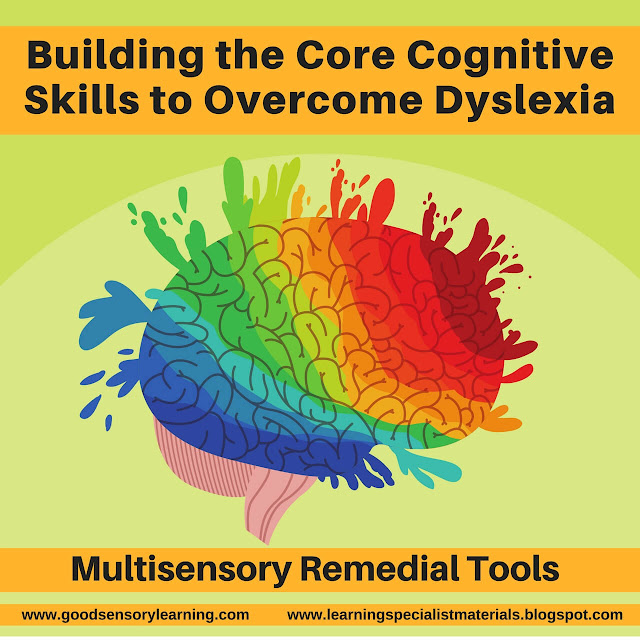This week I wanted to tell you about my online store, Good Sensory Learning. I’m Dr. Erica Warren, and I established this site so I could share all the materials that I have created over the last 20+ years as a learning specialist and educational therapist. When I first began my private practice, Learning to Learn, I had great difficulty finding fun and multisensory materials for my students that were effective and engaging. So back in 2005, I made it my mission to design and distribute high-end, remedial products as well as memorable, motivating lessons that bring delight to learning. If you would like to try a free sampling of my activities , CLICK HERE . How Are the Products Organized at Good Sensory Learning? You can download my Free Printable Catalog or you can browse the site using the grey “search all products” bar in the top right of any page with keywords such as dyslexia, working memory, and executive functioning. What’s more, drop down menus in the red banner allow you t...
Although dyslexia is called a learning disability, it does not mean that one is unable to learn. Instead, dyslexia is a learning difference that often requires multisensory instruction as well as cognitive remediation. Therefore, certain cognitive skills that may come easily for most students may require additional attention and training for many students that struggle with dyslexia.

What Types of Cognitive Skills Need This Extra Attention?

What Types of Cognitive Skills Need This Extra Attention?
Each individual with dyslexia has their own unique profile, but here is a list of some of the common cognitive deficits that result in a diagnosis of dyslexia.
Cognitive remedial therapy is an educational therapy approach that exercises weak areas of cognition to improve core neurocognitive abilities.
Can Cognitive Remedial Therapy Erase Deficits?
A focused intervention plan that targets a specific area of cognition, such as visual memory or auditory discrimination, can improve abilities over time. There is a three-step process:
- Auditory processing: Auditory processing problems do not originate in the ear. Instead, it is an issue with how the brain processes auditory information.
- Visual processing: Visual processing problems also reside in the brain. There are no problems with vision; rather, they are difficulties with how the brain makes sense of visual stimuli.
- Language processing: Language processing is the way people process words to extract information, ideas, and meanings.
- Sequential processing: Sequential processing is the ability to process information in a series or in a sequence.
- Rapid Automatic Naming (RAN): Rapid automatic naming (RAN), or rapid naming, is the ability to quickly process and verbalize a series of familiar items, including letters, numbers, colors or objects. Experts agree that RAN tests can be used to predict reading abilities.
- Executive functioning/attention: Executive functioning is like a mental workspace that encodes, retrieves and manipulates information.
Cognitive remedial therapy is an educational therapy approach that exercises weak areas of cognition to improve core neurocognitive abilities.
Can Cognitive Remedial Therapy Erase Deficits?
A focused intervention plan that targets a specific area of cognition, such as visual memory or auditory discrimination, can improve abilities over time. There is a three-step process:
- Assess abilities: This information can be gleaned from psycho-educational or neuropsychological reports.
- Define the underlying cognitive processing weaknesses: This can be determined by locating the lowest test scores.
- Implement focused exercises: Begin with exercises that match current abilities and gradually increase in difficulty.
Who Offers This Type of Intervention?
Educational therapists and learning specialists are usually the best professionals to help with this form of intervention. You can learn more about these professionals by reading my blog post:
Tutor, Learning Specialist, and Educational Therapist: What's the Difference?
Tutor, Learning Specialist, and Educational Therapist: What's the Difference?
Can I Do These Cognitive Exercises Myself?
Good Sensory Learning offers a wide selection of cognitive remedial tools to help struggling learners with dyslexia and other learning disabilities. To review all of the cognitive remedial tools, click here. In addition, here are a few of my personal favorites for students with dyslexia.
I hope you found this blog helpful! If you need any help defining the specific tools required for cognitive remedial work, reach out any time.
| Product Name | Link |
| Dyslexia Cognitive Remedial Bundle | |
| Executive Functioning Cognitive Remedial Bundle | |
| Working Memory & Hemisphere Integration Bundle |
|
| Following Directions Primary, Beginners, & Intermediate Bundle | |
| Reversing Reversals Download Bundle | |
| Executive Functioning Card Games Bundle | |
| Reading Games Bundle | |
| Speech and Language Bundle | |
| Assessment Bundle |
I hope you found this blog helpful! If you need any help defining the specific tools required for cognitive remedial work, reach out any time.
Cheers, Erica
Dr. Erica Warren is the author, illustrator, and publisher of multisensory educational materials at Good Sensory Learning and Dyslexia Materials. She is also the director of Learning to Learn and Learning Specialist Courses.
· Blog: https://learningspecialistmaterials.blogspot.com/
· YouTube Channel: https://www.youtube.com/user/warrenerica1
· Podcast: https://godyslexia.com/
· Store: http://www.Goodsensorylearning.com/ & www.dyslexiamaterials.com
· Courses: http://www.learningspecialistcourses.com/
· Newsletter Sign-up: https://app.convertkit.com/landing_pages/69400
Dr. Erica Warren is the author, illustrator, and publisher of multisensory educational materials at Good Sensory Learning and Dyslexia Materials. She is also the director of Learning to Learn and Learning Specialist Courses.
· Blog: https://learningspecialistmaterials.blogspot.com/
· YouTube Channel: https://www.youtube.com/user/warrenerica1
· Podcast: https://godyslexia.com/
· Store: http://www.Goodsensorylearning.com/ & www.dyslexiamaterials.com
· Courses: http://www.learningspecialistcourses.com/
· Newsletter Sign-up: https://app.convertkit.com/landing_pages/69400

Comments
Post a Comment